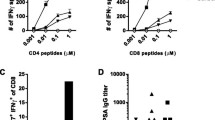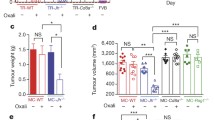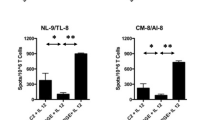Abstract
A pivotal obstacle to cancer immunotherapy is peripheral T cell tolerance to tumor-associated antigens (TAAs). Tolerance induction among mature T cells in the periphery operates through a variety of mechanisms, including anergy and apoptosis. Although Fas-FasL-mediated apoptosis is a well-defined tolerance inducing mechanism, direct evidence of its interference with TAA-specific immunity in vivo is still lacking. In this report, we used the TRAMP mouse, which expresses SV40 large T antigen (Tag) preferentially in the prostate and develops prostate tumors, as a model system to address the role of Fas-mediated apoptosis in regulating peripheral T cell tolerance. Using RT-PCR and tetramer staining to quantify TAA-specific TCR-expressing cytolytic T lymphocytes (CTLs), we have shown the presence of TAA-specific CTLs at higher levels in TRAMP mice than in syngeneic C57Bl/6 mice. Tag-specific immunization led to the expansion of Tag-specific CTLs in C57Bl/6 mice, and to their elimination in TRAMP mice. Interestingly, in TRAMP mice with deficient Fas (Hybrid TRAMP-lpr/lpr), Tag-specific CTL elimination in response to Tag immunization did not take place. The results of cytolytic-function assays were consistent with induction and elimination patterns of TAA-specific CTLs and those of RT-PCR and tetramer staining. In conclusion, our data show that Fas-mediated TAA-specific CTL apoptosis contributes to T cell tolerance and suggest that such tolerance could be potentiated following TAA-specific immunization.





Similar content being viewed by others
Abbreviations
- CTL:
-
Cytotoxic T lymphocyte
- TAA:
-
Tumor-associated antigen
- Tag:
-
SV40 large T antigen
- TRAMP:
-
Transgenic adenocarcinoma of mouse prostate
References
De Visser KE, Schumacher TN, Kruisbeek AM (2003) CD8+ T cell tolerance and cancer immunotherapy. J Immunother 26:1
Lee PP, Yee C, Savage PA, Fong L, Brockstedt D, Weber JS, Johnson D, Swetter S, Thompson J, Greenberg PD, Roederer M, Davis MM (1999) Characterization of circulating T cells specific for tumor-associated antigens in melanoma patients. Nat Med 5:677
Speiser DE, Miranda R, Zakarian A, Bachmann MF, McKall-Faienza K, Odermatt B, Hanahan D, Zinkernagel RM, Ohashi PS (1997) Self antigens expressed by solid tumors do not efficiently stimulate naive or activated T cells: implications for immunotherapy. J Exp Med 186:645
Teague RM, Sather BD, Sacks JA, Huang MZ, Dossett ML, Morimoto J, Tan X, Sutton SE, Cooke MP, Ohlen C, Greenberg PD (2006) Interleukin-15 rescues tolerant CD8+ T cells for use in adoptive immunotherapy of established tumors. Nat Med 12:335
Pardoll DM (2002) Spinning molecular immunology into successful immunotherapy. Nat Rev Immunol 2:227
Pardoll D (2003) Does the immune system see tumors as foreign or self? Annu Rev Immunol 21:807
Drake CG, Jaffee E, Pardoll DM (2006) Mechanisms of immune evasion by tumors. Adv Immunol 90:51
Pardoll D, Allison J (2004) Cancer immunotherapy: breaking the barriers to harvest the crop. Nat Med 10:887
Ju ST, Panka DJ, Cui H, Ettinger R, el-Khatib M, Sherr DH, Stanger BZ, Marshak-Rothstein A (1995) Fas(CD95)/FasL interactions required for programmed cell death after T-cell activation. Nature 373:444
Ferguson TA, Green DR (2001) Fas-ligand and immune privilege: the eyes have it. Cell Death Differ 8:771
Trimble LA, Prince KA, Pestano GA, Daley J, Cantor H (2002) Fas-dependent elimination of nonselected CD8 cells and lpr disease. J Immunol 168:4960
Vacchio MS, Hodes RJ (2005) Fetal expression of Fas ligand is necessary and sufficient for induction of CD8 T cell tolerance to the fetal antigen H-Y during pregnancy. J Immunol 174:4657
Nagata S, Golstein P (1995) The Fas death factor. Science 267:1449
Izui S, Kelley VE, Masuda K, Yoshida H, Roths JB, Murphy ED (1984) Induction of various autoantibodies by mutant gene lpr in several strains of mice. J Immunol 133:227
Radoja S, Saio M, Frey AB (2001) CD8+ tumor-infiltrating lymphocytes are primed for Fas-mediated activation-induced cell death but are not apoptotic in situ. J Immunol 166:6074
French LE, Tschopp J (2002) Defective death receptor signaling as a cause of tumor immune escape. Semin Cancer Biol 12:51
Lees JR, Charbonneau B, Swanson AK, Jensen R, Zhang J, Matusik R, Ratliff TL (2006) Deletion is neither sufficient nor necessary for the induction of peripheral tolerance in mature CD8+ T cells. Immunology 117:248
Romieu R, Baratin M, Kayibanda M, Lacabanne V, Ziol M, Guillet JG, Viguier M (1998) Passive but not active CD8+ T cell-based immunotherapy interferes with liver tumor progression in a transgenic mouse model. J Immunol 161:5133
Schell TD, Mylin LM, Georgoff I, Teresky AK, Levine AJ, Tevethia SS (1999) Cytotoxic T-lymphocyte epitope immunodominance in the control of choroid plexus tumors in simian virus 40 large T antigen transgenic mice. J Virol 73:5981
Schell TD, Knowles BB, Tevethia SS (2000) Sequential loss of cytotoxic T lymphocyte responses to simian virus 40 large T antigen epitopes in T antigen transgenic mice developing osteosarcomas. Cancer Res 60:3002
Zheng X, Gao JX, Zhang H, Geiger TL, Liu Y, Zheng P (2002) Clonal deletion of simian virus 40 large T antigen-specific T cells in the transgenic adenocarcinoma of mouse prostate mice: an important role for clonal deletion in shaping the repertoire of T cells specific for antigens overexpressed in solid tumors. J Immunol 169:4761
Granziero L, Krajewski S, Farness P, Yuan L, Courtney MK, Jackson MR, Peterson PA, Vitiello A (1999) Adoptive immunotherapy prevents prostate cancer in a transgenic animal model. Eur J Immunol 29:1127
Greenberg NM, DeMayo F, Finegold MJ, Medina D, Tilley WD, Aspinall JO, Cunha GR, Donjacour AA, Matusik RJ, Rosen JM (1995) Prostate cancer in a transgenic mouse. Proc Natl Acad Sci USA 92:3439
Xie YC, Hwang C, Overwijk W, Zeng Z, Eng MH, Mule JJ, Imperiale MJ, Restifo NP, Sanda MG (1999) Induction of tumor antigen-specific immunity in vivo by a novel vaccinia vector encoding safety-modified simian virus 40 T antigen. J Natl Canc Inst 91:169
Mylin LM, Schell TD, Roberts D, Epler M, Boesteanu A, Collins EJ, Frelinger JA, Joyce S, Tevethia SS (2000) Quantitation of CD8(+) T-lymphocyte responses to multiple epitopes from simian virus 40 (SV40) large T antigen in C57BL/6 mice immunized with SV40, SV40 T-antigen-transformed cells, or vaccinia virus recombinants expressing full-length T antigen or epitope minigenes. J Virol 74:6922
Hildeman DA, Zhu Y, Mitchell TC, Kappler J, Marrack P (2002) Molecular mechanisms of activated T cell death in vivo. Curr Opin Immunol 14:354
Budd RC (2001) Activation-induced cell death. Curr Opin Immunol 13:356
Rich RF, Green WR (2002) Characterization of the Fas ligand/Fas-dependent apoptosis of antiretroviral, class I MHC tetramer-defined, CD8+ CTL by in vivo retrovirus-infected cells. J Immunol 168:2751
Rich RF, Green WR (2006) Apoptosis of epitope-specific antiretroviral cytotoxic T lymphocytes via Fas ligand–Fas interactions. Viral Immunol 19:424
Rich RF, Green WR (1999) Antiretroviral cytolytic T-lymphocyte nonresponsiveness: FasL/Fas-mediated inhibition of CD4(+) and CD8(+) antiviral T cells by viral antigen-positive veto cells. J Virol 73:3826
Grossmann ME, Davila T, Celis T (2001) Avoiding tolerance against prostatic antigens with subdominant peptide epitopes. J Immunother 24:237
Hess PR, Boczkowski D, Nair SK, Snyder D, Gilboa E (2006) Vaccination with mRNAs encoding tumor-associated antigens and granulocyte-macrophage colony-stimulating factor efficiently primes CTL responses, but is insufficient to overcome tolerance to a model tumor/self antigen. Cancer Immunol Immunother 55:672
Drake CG, Doody AD, Mihalyo MA, Huang CT, Kelleher E, Ravi S, Hipkiss EL, Flies DB, Kennedy EP, Long M, McGary PW, Coryell L, Nelson WG, Pardoll DM, Adler AJ (2005) Androgen ablation mitigates tolerance to a prostate/prostate cancer-restricted antigen. Cancer Cell 7:239
Degl’Innocenti E, Grioni M, Boni A, Camporeale A, Bertilaccio MT, Freschi M, Monno A, Arcelloni C, Greenberg NM, Bellone M (2005) Peripheral T cell tolerance occurs early during spontaneous prostate cancer development and can be rescued by dendritic cell immunization. Eur J Immunol 35:66
Ohlen C, Kalos M, Hong DJ, Shur AC, Greenberg PD (2001) Expression of a tolerizing tumor antigen in peripheral tissue does not preclude recovery of high-affinity CD8+ T cells or CTL immunotherapy of tumors expressing the antigen. J Immunol 166:2863
Ohlen C, Kalos M, Cheng LE, Shur AC, Hong DJ, Carson BD, Kokot NC, Lerner CG, Sather BD, Huseby ES, Greenberg PD (2002) CD8(+) T cell tolerance to a tumor-associated antigen is maintained at the level of expansion rather than effector function. J Exp Med 195:1407
Kishimoto H, Surh CD, Sprent J (1998) A role for Fas in negative selection of thymocytes in vivo. J Exp Med 187:1427
Caldwell SA, Ryan MH, McDuffie E, Abrams SI (2003) The Fas/Fas ligand pathway is important for optimal tumor regression in a mouse model of CTL adoptive immunotherapy of experimental CMS4 lung metastases. J Immunol 171:2402
Finke J, Ferrone S, Frey A, Mufson A, Ochoa A (1999) Where have all the T cells gone? Mechanisms of immune evasion by tumors. Immunol Today 20:158
Murtaza A, Nugent CT, Tailor P, Asensio VC, Biggs JA, Campbell IL, Sherman LA (2001) Altered functional and biochemical response by CD8+ T cells that remain after tolerance. Int Immunol 13:1085
Restifo NP (2001) Countering the ‘counterattack’ hypothesis. Nat Med 7:259
Blattman JN, Greenberg PD (2004) Cancer immunotherapy: a treatment for the masses. Science 305:200
Rosenberg SA, Yang JC, Restifo NP (2004) Cancer immunotherapy: moving beyond current vaccines. Nat Med 10:909
Acknowledgments
This work was supported by National Institutes of Health Grants R01 CA82419 and P50 DK065313. We are thankful for the technical assistance of Jenny Loveridge and Marvin Eng that was pivotal for the experiments described herein.
Author information
Authors and Affiliations
Corresponding author
Rights and permissions
About this article
Cite this article
Tseng-Rogenski, S.S., Arredouani, M.S., Neeley, Y.C. et al. Fas-mediated T cell deletion potentiates tumor antigen-specific tolerance in a mouse model of prostate cancer. Cancer Immunol Immunother 57, 1357–1365 (2008). https://doi.org/10.1007/s00262-008-0471-z
Received:
Accepted:
Published:
Issue Date:
DOI: https://doi.org/10.1007/s00262-008-0471-z




